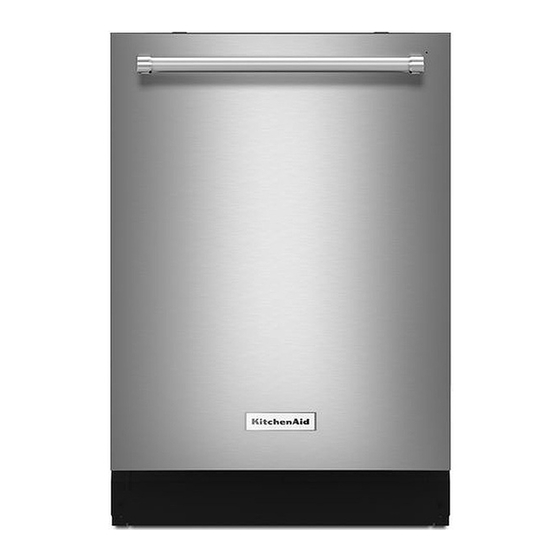KitchenAid KDTE304G User Instructions - Page 14
Browse online or download pdf User Instructions for Dishwasher KitchenAid KDTE304G. KitchenAid KDTE304G 17 pages.

First try the solutions suggested here. If you need further assistance or more recommendations that may help you avoid a service call,
refer to the warranty page in this manual, or visit producthelp.kitchenaid.com In Canada, visit www.kitchenaid.ca.
Contact us by mail with any questions or concerns at the address below:
In the U.S.A.:
KitchenAid Brand Home Appliances
Customer eXperience Center
553 Benson Road
Benton Harbor, MI 49022-2692
Please include a daytime phone number in the correspondence.
PROBLEM
DISHWASHER DOES
NOT RUN
DETERGENT REMAINS
IN THE DISPENSER OR
TABLET IS ON BOTTOM
OF TUB
CYCLE RUNS TOO LONG
DISHWASHER NOT DRYING
WILL NOT FILL
14
Troubleshooting
SOLUTION
NOTE: It is normal for the dishwasher to repeatedly pause several times during a cycle.
If the Start/Resume light is blinking, press START/RESUME and close the door within 4 seconds.
Be sure the door is closed and latched.
Check that there is not an interference between large casserole dishes and the wash system
■
at the back of the dishwasher.
Check to see if any items are protruding through the bottom or back of the rack. Also check to
■
see if tall items are hitting the upper rack or spray arm. Adjust loading as necessary to ensure
door is closed and latched.
Press START/RESUME or CANCEL/DRAIN, or open and close the door before selecting your cycle/
option. Controls must be awakened after a period of inactivity.
Be sure you have selected a cycle. See "Cycle and Option Descriptions" section.
Be sure there is power to the dishwasher. A circuit breaker or fuse may have tripped.
If lights other than Start/Resume blink and the unit will not run, you will need to call for service.
If the numeric display shows a code "F2E2," you will need to call for service.
Check for dishware, such as cookie sheets, cutting boards, or large containers, etc., that may be
blocking the detergent dispenser from opening properly.
Be sure your detergent is fresh and lump-free.
Be sure the cycle has completed (the Clean light is on). If it has not completed, you will need to
resume the cycle by closing the door and pressing Start/Resume.
NOTES:
To use less water and reduce energy consumption, you will encounter cycles that typically run
■
for up to 3 hours.
A water heater setting of 120°F (49°C) is best the dishwasher will delay longer while heating
■
cooler water.
Some options will add time to the cycle. See the "Cycle and Option Descriptions" section.
■
The Heat Dry or ProDry™ option adds approximately 45 minutes.
Try the Express Wash cycle.
Run the hot water at a faucet close to the dishwasher before starting the cycle.
NOTE: Plastic and items with nonstick surfaces are difficult to dry because they have a porous
surface which tends to collect water droplets. Towel drying may be necessary.
Use of rinse aid along with the Heat Dry or ProDry™ option is needed for proper drying.
Proper loading of items can affect drying. (See specific loading instructions within this guide.)
Glasses and cups with concave bottoms hold water. This water may spill onto other items
when unloading.
Unload the bottom rack first.
■
Locate these items on the more slanted side of the rack for improved results.
■
Be sure the water to the dishwasher is turned on.
Check that the overfill protection float is free from obstructions. See the "Parts and Features" section.
Check for suds in the dishwasher. If foam or suds are detected, the dishwasher may not operate
properly or may not fill with water. See "Blinking Lights" in the "Troubleshooting" section.
In Canada:
KitchenAid Brand Home Appliances
Customer eXperience Centre
200 – 6750 Century Ave.
Mississauga, Ontario L5N 0B7
